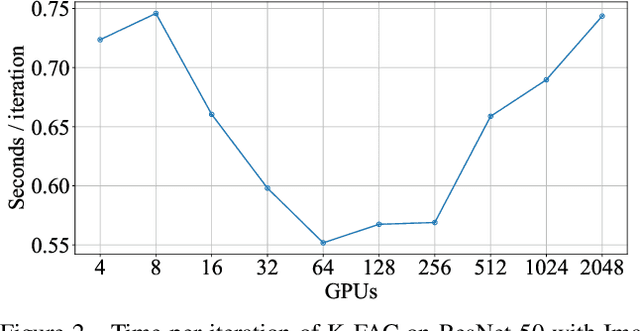Yohei Tsuji
Scalable and Practical Natural Gradient for Large-Scale Deep Learning
Feb 13, 2020



Abstract:Large-scale distributed training of deep neural networks results in models with worse generalization performance as a result of the increase in the effective mini-batch size. Previous approaches attempt to address this problem by varying the learning rate and batch size over epochs and layers, or ad hoc modifications of batch normalization. We propose Scalable and Practical Natural Gradient Descent (SP-NGD), a principled approach for training models that allows them to attain similar generalization performance to models trained with first-order optimization methods, but with accelerated convergence. Furthermore, SP-NGD scales to large mini-batch sizes with a negligible computational overhead as compared to first-order methods. We evaluated SP-NGD on a benchmark task where highly optimized first-order methods are available as references: training a ResNet-50 model for image classification on ImageNet. We demonstrate convergence to a top-1 validation accuracy of 75.4% in 5.5 minutes using a mini-batch size of 32,768 with 1,024 GPUs, as well as an accuracy of 74.9% with an extremely large mini-batch size of 131,072 in 873 steps of SP-NGD.
Second-order Optimization Method for Large Mini-batch: Training ResNet-50 on ImageNet in 35 Epochs
Dec 05, 2018



Abstract:Large-scale distributed training of deep neural networks suffer from the generalization gap caused by the increase in the effective mini-batch size. Previous approaches try to solve this problem by varying the learning rate and batch size over epochs and layers, or some ad hoc modification of the batch normalization. We propose an alternative approach using a second-order optimization method that shows similar generalization capability to first-order methods, but converges faster and can handle larger mini-batches. To test our method on a benchmark where highly optimized first-order methods are available as references, we train ResNet-50 on ImageNet. We converged to 75% Top-1 validation accuracy in 35 epochs for mini-batch sizes under 16,384, and achieved 75% even with a mini-batch size of 131,072, which took 100 epochs.
 Add to Chrome
Add to Chrome Add to Firefox
Add to Firefox Add to Edge
Add to Edge